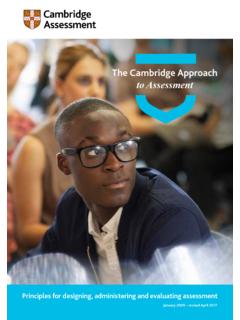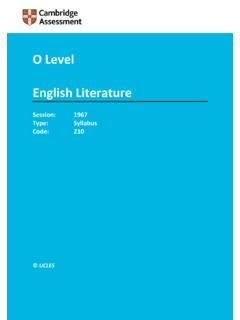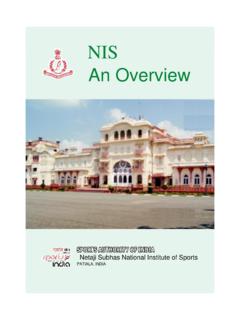Transcription of Postgraduate Certificate in Educational Assessment …
1 Postgraduate Certificate in Educational Assessment and Examinations UCLES | University of Cambridge 2018 Course outline for current and prospective students January 2018 This document is regularly updated. Please check back for updates. Introduction This is a one-year, part-time course worth 60 credits at Master s level (Level 7). It is a practice-based and professionally relevant course, grounded in current research and theory, led by tutors from Cambridge Assessment and the University of Cambridge Faculty of Education. This course is for people who want to expand their knowledge and understanding of Assessment and examinations. It will be valuable to you if you are working for an awarding organisation or a government body, if you are an examiner or if you are a teacher with a special interest in Educational Assessment and examinations.
2 This course is part of the Faculty of Education Practitioner Professional Development Programme (PPD). This information should be read in conjunction with the PPD Admissions Guide. The normal requirements for this course are that students must be capable of working at Master s degree level and demonstrate this by holding one or more of the following academic or other qualifications: A good honours degree A PGCE assessed at Master s level Recent (within three years) completion of professional qualifications at level six or above Overseas qualifications equivalent to the above (For an Assessment of overseas qualifications contactNational Academic Recognition Centre for the United Kingdom) Non-English speaking overseas applicants may also require an IELTS qualification with a minimum score of 7in each this course is aimed at practising professionals, professional experience and engagement are recognised as alternatives to recent academic qualifications as indicating the potential for working at Master s level.
3 Aims and benefits The course will enable people working for awarding organisations and government bodies, and teachers with a strong and special interest in Assessment , to develop their understanding and skills, and to prepare for new roles as Assessment leaders in their institutions. It is expected to have a significant impact on individual professional learning about, and understanding of, Educational Assessment and its evaluation. The nature of the impact will vary according to the aims and intentions of individuals undertaking the course but all students will apply what they learn to their working contexts. UCLES | University of Cambridge 2018 pgca The course will enable students to: review the purposes of Assessment ; critique the validity and quality of forms of Assessment ; evaluate different approaches to validation; evaluate standard-setting, consistency and reliability in Assessment ; develop their knowledge and understanding of academic research; undertake small scale enquiry into Assessment related issues; explore future directions in Assessment .
4 The impact may be evidenced through: developments in practitioner learning and understanding; revised policies; changes in Assessment practice; understanding of perspectives and views gathered from Assessment stakeholders; personal reflections on the processes of development and change in Assessment ; recognition of implications for future practice. The practice-focused and professionally relevant academic study will be at Master s level, and so the course may be used as part of a progression route to the Cambridge Masters in Education. Tutors The course is led by a teaching team of staff from the Faculty of Education and Cambridge Assessment . The team is chaired by Dr Ayesha Ahmed. Andrew Watts began his career as a teacher of English in secondary schools in the UK. After eleven years he moved to Singapore where he taught in a Junior College for over four years.
5 He then worked for five years in the Ministry of Education in Singapore, focusing on curriculum development and in-service teacher development. In 1990 he returned to England and worked with Cambridge Assessment from 1992 to 2008. For most of that time he looked after teams that were developing national tests in English, Maths and Science for 14 year olds in England, Northern Ireland and Wales. From 2004 he set up and ran the Cambridge Assessment Network, which provides professional development opportunities for Assessment professionals internationally. Since leaving Cambridge Assessment he has worked on numerous Assessment projects on a freelance basis. In 2015 he began working on a PhD on the history of examinations in England, based at Wolfson College and the University of Cambridge Faculty of Education. Annabel Charles was a secondary English teacher before spending 13 years working on a national test development programme in the research department at Cambridge Assessment .
6 For the last 12 years, she has been a freelance consultant on a variety of projects linked to curriculum development and Assessment . She has worked for national bodies such as QCDA and Ofqual on research and evaluation projects and developed curriculum, Assessment and training material for a range of companies. She is currently Principal Examiner for an English specification and has also worked on a variety of tests for the UK and overseas. Annabel has been involved in training for schools, local authorities, the Chartered Institute of Educational Assessors and Cambridge Assessment Network. She has an MA in Educational Assessment , is a Subject Expert for Ofqual and a Chartered Educational Assessor. Ayesha Ahmed is a Senior Teaching Associate at the Faculty of Education. She has worked in Educational Assessment since 1997, the first 9 years of which was in the Research Division at Cambridge Assessment .
7 Following this she was a freelance research and training consultant, carrying out projects for exam boards and Ofqual, including training question writers in the UK and internationally. For the past four and a half years she has been working at the University of Cambridge researching the Assessment of spoken language and group work, and teaching on the Education Tripos. She is a Fellow of the Association for Educational Assessment -Europe, an Executive Editor of the journal Assessment in Education: principles, policy and practice, a member of the Research Advisory Group for Ofqual and for AQA and a Senior Member of Hughes Hall, Cambridge. UCLES | University of Cambridge 2018 Gill Francis has 14 years experience in working in Educational settings and is familiar with testing practices in the Caribbean and UK contexts.
8 She is a trained primary school teacher and holds a Bachelor s degree in Educational Testing, Measurement and Evaluation and an MPhil in Education and Psychology. More recently, she has provided consultancy services to CIE and is currently pursuing a PhD in education at the Faculty of Education with a concentration on cognitive psychology. Her research experience includes investigating teachers perceptions and applications of the test development process in classroom summative testing and exploring cognitive factors that affect achievement for students from poor SES backgrounds. Jill Grimshaw is the Course Director and Senior Manager for the Cambridge Assessment Network. She has many years experience of working in Assessment and is particularly interested in making Assessment useful, purposeful and understandable for those who use it.
9 She trained as a secondary school teacher of MFL and has more recently worked predominantly with teachers and Assessment professionals. She has written and delivered many different types of course on the subject of Assessment . Riikka Hofmann is a Research and Teaching Associate in the Faculty of Education. Her research focuses on classroom interaction, learning through talk, pedagogic innovations, professional learning and change, student engagement and young people and professionals agency and identities as learners, studied from the perspective of sociocultural psychology. Riikka has taught on the Faculty s Masters courses since 2003 and is the Coordinator of the MPhil Research Methods course and Co-coordinator of the MPhil/MEd Educational Research. She also teaches at the SSRMC. Riikka has taught all age groups from infants to doctoral students and her teaching also closely engages with research.
10 Prior to coming to Cambridge, Riikka studied Education Studies, Psychology and Sociology and Social science research methods at the Universities of Helsinki and Munich while being involved in various research projects in both institutions. Martina Kuvalja is an Educational researcher and a speech and language therapist. She did both her MPhil and PhD in Psychology and Education at the University of Cambridge. Previously she worked as a speech and language therapist, a researcher investigating metacognition and self-regulation in young children, and as an independent consultant. For the past two years, Martina has worked as a researcher for Cambridge Assessment on projects related to Educational Assessment in an international setting. Shakeh Manassian began her career as an ESOL teacher, and moved to working in Assessment in1999, when she joined Cambridge English as a subject officer.









